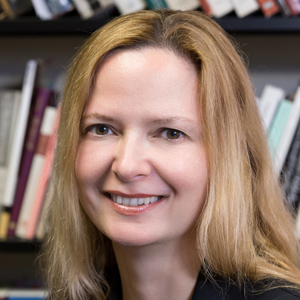Exchange: Adrienne Rich—Fact Check Exchange: Adrienne Rich—Fact Check
Brooklyn, N.Y. I have always been a huge admirer of Ange Mlinko’s poetry and her shrewd criticism. But I must part ways with her opinions in her review of Adrienne Rich’s Later Poems, “Diagram This” [Feb. 18]. Mlinko uses swaths of my essay to buttress her point that Rich is no longer relevant to a younger generation of poets because that generation favors indeterminacy as opposed to Rich’s poetry of conviction. I’m afraid that Mlinko greatly misread my essay, which is in fact a celebration of Rich. Mlinko quotes me as follows: I “had a period when I reacted against her in college…. It was a reaction against white bourgeois feminists who assumed their plight was universal.” Mlinko does not include my rebuttal to my younger, knee-jerk self in the essay: “I misread her of course. It wasn’t until after college that I read ‘Diving Into the Wreck’ and I realized that her poetry was so breathtaking and so powerful because of her commitment to the collective.” I did imply that perhaps a younger generation does favor play over conviction, but this was actually an implied criticism of present trends in poetry. It was also an inward critical look at my own cynicism about poetry’s social function. “At such cynical moments,” I wrote in my essay, ”I turn to Rich for her courage.” But I would also caution against making such polarizing generational distinctions. There is so much negative capability in Rich’s poetry. Re-examine her “Twenty-One Love Poems,” which struggles to remake the sonnet so that it makes room for lesbian love. Read her open-ended ghazals and her “Phenomenology of Anger.” Her lines “quiver with equivocation,” but they also quiver with a rage that was not permitted in poetry. There is no irony in Rich’s writing, which is the largest distinction between her work and poetry like my own and some of my peers. But at the same time, she has inspired and continues to inspire legions of young poets. True, you will rarely see her being taught next to John Ashbery and Charles Olson in a graduate poetry seminar. But when I teach her in grad and undergrad workshops, students are awed by her poems and not just by her legacy. Rich had an omnivorously diverse aesthetic appetite—unlike some of the other “old guard” poets, she didn’t care about camps. What mattered was that the poem took risks conceptually and formally. She inspired an aesthetically diverse field of poets: Elizabeth Willis, Anne Waldman, Ed Pavlic, Peter Gizzi, Suzanne Gardinier and, yes, even Charles Bernstein. When I was in Cape Town, young South African poets all cited Rich as the American poet who inspired them the most. Her influence travels widely and divergently. I’m glad that Mlinko wrote the review. Debates should be generated from Rich’s poetry. Rich, in her poetry and as a poet, was divisive. She was not uniformly venerated; she did not play it safe or quietly wait her turn until she won her big awards. She pissed people off with her poetry, with her stances, with her contrarian opinions, with her strong conviction for justice. This is why she’s so important and why she’s been so transformative. It’s only appropriate, then, that Rich’s work continues to generate heated debate today. CATHY PARK HONG Paris; Wakefield, R.I.; Tarrytown, N.Y.; Brooklyn, N.Y. Ange Mlinko’s review includes a surprising number of factual errors. She refers to “poetry collections from younger white or Jewish poets whose emotional lives are inextricably bound up with new motherhood” and includes Brenda Shaughnessy. Leaving aside the peculiarity of “white or Jewish,” we note that Shaughnessy is neither. (It is opinion to add this, but to imply that younger women poets writing about motherhood are reacting against Rich seems peculiar: poets, not all “white or Jewish,” have been writing such work since the resurgence of the women’s movement in the 1970s.) Mlinko cites “Paul Valéry’s words to Edgar Degas: ‘A poem is not made of ideas, it is made of words.’” But it was Mallarmé who said, “Mais, Degas, ce n’est point avec des idées que l’on fait des vers…. C’est avec des mots.” Mlinko says “the famous sequence ‘Twenty-One Love Songs’ feels misnamed; these aren’t songs…but further meditations, addresses, in a rhetorical mode.” But the sequence is in fact titled “Twenty-One Love Poems” (and is referred to as such earlier in the review). “Feels misnamed”—but it’s Mlinko who does the misnaming. In addition to making these possibly trivial but cumulatively disconcerting errors, Mlinko quotes selectively from a recent essay by Cathy Park Hong. Claiming that younger poets are not influenced by Rich and are not attracted to the poetry of “commitment,” Mlinko writes, “Cathy Park Hong…has admitted that she ‘had a period when I reacted against her in college,’” but does not mention that further in her essay, Hong repudiates that view. Mlinko again quotes approvingly from Hong, who writes: “I thought about the word commitment. This is a word that rarely comes up in workshop. Instead, there is this word: play.” But, again, Hong is repudiating, not endorsing, this position. How could Mlinko have missed this? MARILYN HACKER, LINDA GARDINER, ALFRED CORN, JESSICA GREENBAUM, JESSICA REED Mlinko Replies Houston The letter writers are chagrined that their idol is not unequivocally praised in the pages of The Nation. But Marilyn Hacker et al. see animosity where none was intended. Going by Emily Dickinson’s criterion for poetry, I don’t feel as though the top of my head were taken off. Hong’s poetry does not “repudiate” the aesthetics of play—she is the very model of the linguistically playful, daring poet. I quote Hong’s first impressions of Rich’s work because it is a viewpoint shared by many (much as it may pain the letter writers to hear it). If Hong softened her stance, one cannot wholly discount the fact that Rich bestowed a huge prize on her and subsequently befriended her. This is not to disparage Hong, or to question her devotion to Rich, but to point out the obvious: having lunch with elders who give you prizes may have a mellowing effect on your aesthetic judgment. In any case, she didn’t feel the top of her head taken off at first read, either. If this is controversial, then as Hong suggests, let the controversy rage. The Shaughnessy criticism is trivial. Is she Japanese because she was born in Japan? Or Japanese-American because she was raised in the United States? If she is a Japanese-American poet, then I, with two immigrant parents, demand to be known henceforth as a Belorussian-Hungarian-American poet. Clarification on a Million Moms Katha Pollitt, in “Subject to Debate” [Aug. 27/Sept. 3], referred to the Million Mom March, in May 2000, as being “loosely tied to the Gore campaign.” The Nation confirms that this statement is not true. Donna Dees, who founded the Million Mom March and had a leadership role within it, has issued the following statement: “MMM was not connected to any political party, candidate or representative from the White House. In particular, MMM was not affiliated with Al Gore’s presidential campaign, and there is no basis in fact for any supposition to infer inappropriate political affiliations. MMM has always been an independent grassroots advocacy organization to promote sensible gun regulations, which include, but are not limited to, childproofing handguns, universal background checks on all gun sales, licensing gun owners and registering their firearms.”
Mar 5, 2013 / Our Readers and Ange Mlinko
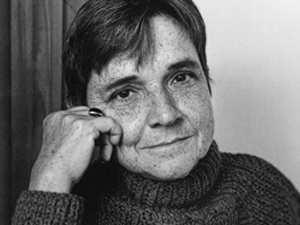
Diagram This: On Adrienne Rich Diagram This: On Adrienne Rich
A new collection of Adrienne Rich’s poems does not show her at her best.
Jan 30, 2013 / Books & the Arts / Ange Mlinko
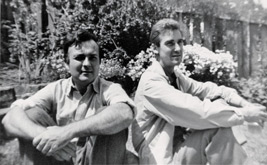
The Unconquered Flame: On Robert Duncan The Unconquered Flame: On Robert Duncan
A new biography shows how the poet Robert Duncan fed a line backward into the labyrinthine history of human imagination.
Sep 18, 2012 / Books & the Arts / Ange Mlinko
Azure Azure
It’s that wafer ash set next to the hardy Dutchman’s pipe that reminds me of the unlikely sight we caught on hotel cable TV: Al Schön espousing orange wines. Two decades ago, he was the school’s athlete-Platonist. And now we’re all as louche and brown around the edges as this Baronne Prevost. The Julia Child, the Rise and Shine —these rosebuds exist to ornament fulsome christenings. So it happens today that Azure is introduced toddling in a glade of bamboo topping out at a whisper on the hillside. “Azure, meet our Gray.” “Gray, Azure.”
Mar 21, 2012 / Books & the Arts / Ange Mlinko
Cicadas Cicadas
Gray rainbows in the nighttime irrigation. Immediately forgotten. Then I hear a child carry a tune in a whisper. I was dashing through those ashen rainbows immediately forgotten. You could truncate butterfly to butte and still get migration and a cumin route. But not camel. Not emu. Not Tuareg. Not a Russian garlic dome like painted clove on steppe nor geodesic ostrich egg. Totally forgotten, til the child’s moonbow tune whispered in what wagon, rickshaw, landau rattled me to a carrefour. I couldn’t tell the autumn from the drought, crescent over Quonset hut, or put language to the pulp that made me ill. Inside the mouth of the water-flow monitors, goblin goblin—robin. New World cicadas that chant in parabolas. A new address, a dryness, they stop. Focal chill.
Mar 21, 2012 / Books & the Arts / Ange Mlinko
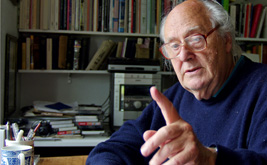
Hard Against Time: On Roy Fisher Hard Against Time: On Roy Fisher
The Midlands poet Roy Fisher has never aspired to a readership. All the more reason to welcome his Selected Poems.
Jul 27, 2011 / Books & the Arts / Ange Mlinko
The Canting Crew The Canting Crew
A new edition of The First English Dictionary of Slang is a saucy survey of the rogue jargon of the late seventeenth century.
Jun 14, 2011 / Books & the Arts / Ange Mlinko
Three Poems by Ange Mlinko Three Poems by Ange Mlinko
"After Sappho (The Volcano)," "The Children's Museum," "Threading the Q"
May 31, 2011 / Books & the Arts / Ange Mlinko
Out of the Mouths of Birds Out of the Mouths of Birds
Is there a human language without birdsong in it?
Mar 22, 2011 / Books & the Arts / Ange Mlinko
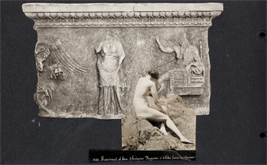
Duncan’s Divagations: On Robert Duncan and H.D. Duncan’s Divagations: On Robert Duncan and H.D.
Robert Duncan saw in H.D.'s poetry “The story of survival, the evolution of forms in which live survives.”
Feb 3, 2011 / Books & the Arts / Ange Mlinko

